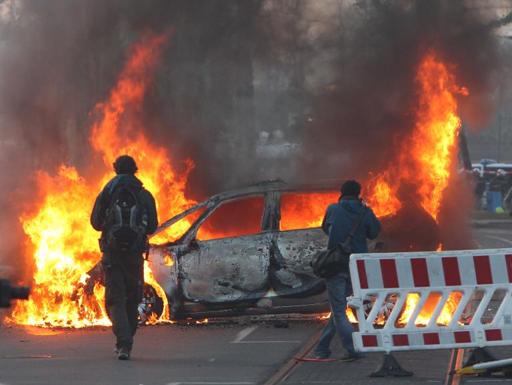Street clashes during protests against the European Central Bank on Wednesday injured 14 German police and 21 anti-capitalist protesters, police and rally organisers said.
Police in the banking capital of Frankfurt also said they had made 16 arrests by 2:30 pm (1330 GMT), mostly on charges of disturbing the peace and arson after seven police cars were set ablaze.
Police said 80 of their officers had been hurt by an irritant gas, but were back on duty, while Blockupy protest organisers said on Twitter that 107 demonstrators were hurt by tear gas and pepper spray.
At a press conference, Blockupy spokesman Ulrich Wilken distanced the organisation from the violence.
"I would have hoped that the morning protests would be very different. This is not what we in Blockupy had had planned," Wilken said.
At the same time, he said he "understood" people's anger at the "policies of impoverishment" being forced by governments on to people in the crisis-hit countries.
Nonetheless, attacks on fire brigade vehicles had no place in demonstrations in Germany, Wilken insisted.
He said he hoped the planned rally in Frankfurt later in the afternoon would show the protests in a different, peaceful light.
Another Blockupy spokesman, Christoph Kleine, estimated that around 6,000 demonstrators had converged on Germany's financial capital, including 1,000 international activists.
Kleine argued that police should shoulder some of the blame for the violence, accusing them of using excessive force to provoke demonstrators.
In Berlin, top politicians condemned the chaotic scenes.
Finance Minister Wolfgang Schaeuble said that "no-one has the right to threaten life and limb of police and firefighters".
Economy Minister and Vice Chancellor Sigmar Gabriel said that to blame the ECB for Europe's woes "testifies to a significant lack of understanding about what the ECB is currently doing for cohesion in Europe".






















































